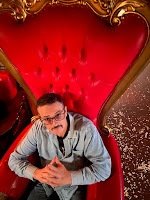When Kolchak: The Night Stalker premiered on ABC in 1974, pre-teen me was primed and ready.
The show starred Darren McGavin (TV's first Mike Hammer) as a frumpy Chicago news reporter who inadvertently got tangled up in the supernatural, only to have his stories quashed and the truth covered up by higher powers.
In other words, every episode was a mini conspiracy theory. Chris Carter, X-Files creator, was paying attention.
The spooky element lured me in, but the show promised more. Kolchak presented zombies and aliens and Aztec mummies as verifiable truths that could be brought into the light with journalistic reporting, as well as by Kolchak's trusty Rollei 16 camera. The real bogeymen were the FBI agents, police chiefs, and politicians who but the kibosh on Kolchak's news stories.
Pre-teen me subscribed to Official UFO magazine, various marvel comics, Famous Monsters of Filmland, and Starlog. Kolchak was just what I was looking for. A few years later, so was In Search Of. By the time Art Bell and X-Files rolled around, I was far from convinced that flying saucers and little green men were real, but I still found purveyors of the unknown totally entertaining.
I've become much more of a skeptic, but I haven't lost my love of a good conspiracy theory. I recently listened to the ten-episode run of Who Killed JFK, the excellent podcast series created by actor/director Rob Reiner. Each installment left me on the edge of my seat. Its conclusions are based on decades of multiple investigations, and there are interviews aplenty. Who Killed JFK makes a compelling case that sinister forces in our government were much more involved in Dallas than in Area 51.
 |
| Art Bell |
I can't say that many of the big conspiracy theories making the rounds these days are grabbing me. Many, including those fueled by a certain school of on-line political discourse, seem like they are purely in the service of demonizing prominent Democrats and casting doubt on the 2020 election. These conspiracy theories have hi-jacked the stuff I'd stay up for when Art Bell was hosting his late-night radio show Coast to Coast AM. Art Bell dealt not only in UFOs and JFK, but all things out there, including clones, satanic groups, and even time travel. He was Kolchak with a microphone and 50,000 Watts.
Those currently playing politics with conspiracy theories are doing them a great disservice, and "Deep Time" is my opportunity to hi-jack them back.
"Deep Time" is my contribution to the SleuthSayers crime anthology Murder, Neat, edited by Michael Bracken and Barb Goffman. Murder, Neat features crime fiction set in drinking establishments. I set "Deep Time" in the fictional upscale pub The Burke, located in Yorba Linda, CA. It's important to note that Yorba Linda is the most conservative city in California, according to the Sacramento Bee. When the events of "Deep Time" occur, The Burke is open illegally during the darkest days of the Covid pandemic.
 |
| The Richard Nixon Library Yorba Linda, CA |
In "Deep Time," a team of con artists descends on The Burke. Their mark is a regular who is also the
founder of the alt-right conspiracy blog Deep Time. He's a self-proclaimed expert on "tracking the Deep State through time, space, and all dimensions in between." He's also the scion of a wealthy businessman, and the grifters aim to blackmail him. Things get strange when what could be a genuine unexplained phenomenon shows up in The Burke's men's room.
To quote Carl Kolchak, "Judge for yourself its believability and then try to tell yourself, wherever you may be, it couldn't happen here."
Lawrence Maddox is happy to be once again roaming the hallowed halls of SleuthSayers, though he swears he's being followed. For more tales of cons and marks, check out The Down and Out, Lawrence's installment in the excellent A Grifter's Song series, from Down and Out Books. You can reach Lawrence at madxbooks@gmail.com.






















